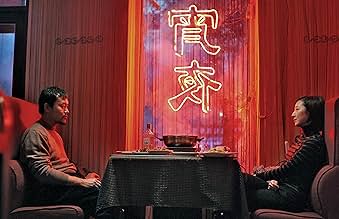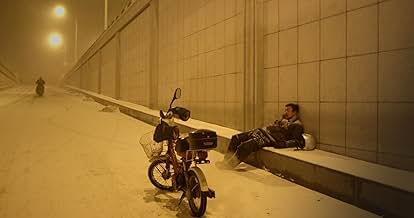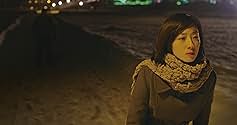IMDb रेटिंग
6.7/10
10 हज़ार
आपकी रेटिंग
एक पूर्व पुलिस कर्मचारी और उसके पूर्व साथी ने हत्याओं की उस श्रृंखला की जांच करने का फैसला किया, जिसने उन्हें शर्मिंदा कर उनके करियर को समाप्त कर दिया था, जब हुबहू वैसी ही हत्याएं फिर शुरू ह... सभी पढ़ेंएक पूर्व पुलिस कर्मचारी और उसके पूर्व साथी ने हत्याओं की उस श्रृंखला की जांच करने का फैसला किया, जिसने उन्हें शर्मिंदा कर उनके करियर को समाप्त कर दिया था, जब हुबहू वैसी ही हत्याएं फिर शुरू हो जाती हैं.एक पूर्व पुलिस कर्मचारी और उसके पूर्व साथी ने हत्याओं की उस श्रृंखला की जांच करने का फैसला किया, जिसने उन्हें शर्मिंदा कर उनके करियर को समाप्त कर दिया था, जब हुबहू वैसी ही हत्याएं फिर शुरू हो जाती हैं.
- पुरस्कार
- 28 जीत और कुल 46 नामांकन
फ़ीचर्ड समीक्षाएं
OK, so yes - this is a very slow burn a times with far too many establishing and shots of decaying urban industrialisation, but when the action does actually focus on the story it's not a bad crime drama at all. We start with an arm sticking out of a pile of coal. The cops arrive and "Zhang" (Fan Liao) is soon on the case. He can only identify the corpse, though, and unimpressed his bosses ensure that five years down the line he is reduced to working as a security guard with a penchant for the bottle too. What we now know, though, is that there were a series of such killings and they are now under his fingernails. He is obsessed with identifying the killer. Reuniting with his for partner "Liang" (Xuebing Wang), they pick up a trail that leads them to the enigmatic "Wu Zhizhen" (Gwei Lun-Mei). "Zhang" now vacillates between an attraction to this woman and to suspecting her, but has she anything to do with the crimes? It's a curiously developed film, this. It proceeds in fits and starts before a denouement that is rushed and rather unfulfilling. It looks gritty and dark, the weather - cold and miserable, also helps to create an atmosphere and the acting is competent. Maybe it could lose twenty minutes of preambling characterisations, but it has a solid story with director Yi'nan Diao getting close to the the best from Fan Liao and his lumps of coal.
The plot is that two cops who have had their careers ruined, by a case that went horribly wrong, decide to reunite. This they do after a murder that has striking similarities to the one that floored them happens again.
Zhang Zili has lost everything, his wife, the job he loved and has turned to the bottle as he goes through the motions as an underpaid security guard. Then he gets the chance to solve the case that is his nemesis. This is not a police procedural though; this has elements of the heart, base existentialism and even dark humour.
This is from director and writer Yi'nan Diao who brought us 'Night Train' and 'Uniform'. He comes from a very industrialised part of China and this is generally reflected in his films - and indeed it is here. Also the loneliness that comes from the isolating capacity of industrialised living. This though is a confident and assured piece of film making. Even when I thought a scene or two had stayed going a tad too long, he just reveals why and all of a sudden you are right back on track. In Mandarin and running to around 100 minutes this will appeal to those who appreciate modern Chinese cinema and who like a bit of dark brooding to their crime thrillers.
Zhang Zili has lost everything, his wife, the job he loved and has turned to the bottle as he goes through the motions as an underpaid security guard. Then he gets the chance to solve the case that is his nemesis. This is not a police procedural though; this has elements of the heart, base existentialism and even dark humour.
This is from director and writer Yi'nan Diao who brought us 'Night Train' and 'Uniform'. He comes from a very industrialised part of China and this is generally reflected in his films - and indeed it is here. Also the loneliness that comes from the isolating capacity of industrialised living. This though is a confident and assured piece of film making. Even when I thought a scene or two had stayed going a tad too long, he just reveals why and all of a sudden you are right back on track. In Mandarin and running to around 100 minutes this will appeal to those who appreciate modern Chinese cinema and who like a bit of dark brooding to their crime thrillers.
An ex-detective re-investigates a strange unsolved murder case that effectively ended his career five years previously. In doing so he ends up becoming increasingly involved with a young woman who seems to be connected with a series of similar killings.
It was good to see an example of a Chinese neo-noir. My previous experience with films from China has been usually of movies of epic proportions with big production values. So it made for a refreshing change to see something more low-key and contemporary. This one sets out its stall very well with the sinister discovery of various body parts being found in bags of coal spread all over the country, huge distances apart. The introduction of a femme fatale into the mix only ups the intrigue level further. And I have to say that on the whole I did enjoy this film and found it compelling, with its Chinese origins ensuring that it was a little different and punctuated with unpredictable moments. By the end of the piece it would be only fair to say that some questions still remain. I thought the ending was really very strange indeed with an odd final few moments and an ambiguous feeling. It almost feels like a superfluous ending but maybe I missed something in it. In truth odd things happen on a number of occasions throughout this one and reasons are not always very forthcoming, I am guessing this is a film that would benefit from a re-watch possibly. Also good was the wintry atmosphere of the snowy locales where the action unfolds that created a feeling all of its own which worked well. But I would probably have to conclude that, while I definitely liked this one, it does falls short of being great. It's not really that suspenseful for this type of film and the plot development doesn't ultimately reveal all that good a mystery in the final analysis. Certainly a good enough movie I have to emphasise but it just has a few hard to ignore unsatisfying flaws as well though.
It was good to see an example of a Chinese neo-noir. My previous experience with films from China has been usually of movies of epic proportions with big production values. So it made for a refreshing change to see something more low-key and contemporary. This one sets out its stall very well with the sinister discovery of various body parts being found in bags of coal spread all over the country, huge distances apart. The introduction of a femme fatale into the mix only ups the intrigue level further. And I have to say that on the whole I did enjoy this film and found it compelling, with its Chinese origins ensuring that it was a little different and punctuated with unpredictable moments. By the end of the piece it would be only fair to say that some questions still remain. I thought the ending was really very strange indeed with an odd final few moments and an ambiguous feeling. It almost feels like a superfluous ending but maybe I missed something in it. In truth odd things happen on a number of occasions throughout this one and reasons are not always very forthcoming, I am guessing this is a film that would benefit from a re-watch possibly. Also good was the wintry atmosphere of the snowy locales where the action unfolds that created a feeling all of its own which worked well. But I would probably have to conclude that, while I definitely liked this one, it does falls short of being great. It's not really that suspenseful for this type of film and the plot development doesn't ultimately reveal all that good a mystery in the final analysis. Certainly a good enough movie I have to emphasise but it just has a few hard to ignore unsatisfying flaws as well though.
How does a Chinese director empty the noir sensibility of any and all of the glamour associated with its Hollywood counterpart? How does it become a study in pure dourness and grimness? If you're Yi'nan Diao, the first thing you do is set it in a place as grim and dour as a northern Chinese factory town circa 1999. In this frozen wasteland that may or may not be Harbin – it doesn't matter, it could be Siberia – the ball gets rolling when dead body parts start showing up on the conveyor belt of a coal processing plant: after all, in this time and space in China, the human body is just another physical commodity
Following a bloody shootout that leaves the two main suspects and two of his partners dead, we jump forward five years to find the surviving detective, Zhang Zili, paralyzed by the trauma, retired from the police force and passed out in the snow in an alcoholic stupor. But things are never what they seem in noir, right? So he's dragged back into the case when a former partner of his suspects the involvement of a black widow- like female at the heart of the matter. An exotic call girl? A mysterious nightclub singer? No – just some depressed woman who works at a dry cleaner's where she's regularly mauled by her piggish oaf of a boss.
The plot is unimportant, really, because the film is one big painting, a night-time world where the neon signs of the internet gambling dens and bleak taxi-dancing joints are beaten into submission by the cold dark chill of northern China, where all color and light are sucked into the film's essence, which is nothing but a black hole, a gravitational death machine that swallows up every photon in sight. At one point, while spinning around the world's most depressing ice skating rink, Zili asks his former partner, "Does anybody ever really win at life?" Of course not. Like all the other catatonic ice skaters, he's just going round and round, sometimes ahead, sometimes behind (depending on one's point of view ) getting nowhere while people continue to copulate and kill and die. The key to the film is the direct translation of the Chinese title, which means "daytime fireworks." I'll let you figure that out for yourself, but if you like your noir pitch-black, this one's for you.
Following a bloody shootout that leaves the two main suspects and two of his partners dead, we jump forward five years to find the surviving detective, Zhang Zili, paralyzed by the trauma, retired from the police force and passed out in the snow in an alcoholic stupor. But things are never what they seem in noir, right? So he's dragged back into the case when a former partner of his suspects the involvement of a black widow- like female at the heart of the matter. An exotic call girl? A mysterious nightclub singer? No – just some depressed woman who works at a dry cleaner's where she's regularly mauled by her piggish oaf of a boss.
The plot is unimportant, really, because the film is one big painting, a night-time world where the neon signs of the internet gambling dens and bleak taxi-dancing joints are beaten into submission by the cold dark chill of northern China, where all color and light are sucked into the film's essence, which is nothing but a black hole, a gravitational death machine that swallows up every photon in sight. At one point, while spinning around the world's most depressing ice skating rink, Zili asks his former partner, "Does anybody ever really win at life?" Of course not. Like all the other catatonic ice skaters, he's just going round and round, sometimes ahead, sometimes behind (depending on one's point of view ) getting nowhere while people continue to copulate and kill and die. The key to the film is the direct translation of the Chinese title, which means "daytime fireworks." I'll let you figure that out for yourself, but if you like your noir pitch-black, this one's for you.
In snow covered streets surrounded by perpetual darkness detectives and suspects are made distinguishable only by the soft glow of neon signs. Faces are shrouded by shadow, characters motives are unclear. We are in very classic noir territory in Black Coal, Thin Ice.
A brutal murder occurs in Northern China. Severed limbs appear simultaneously across the country in coal plants. The investigation into the murder is botched, leaving detective Zhang Zili injured, ashamed and without a job. Five years later, body parts are found in coal plants. Now an alcoholic and working as a security guard, Zhang once again finds himself in the pursuit of the mysterious mass murderer. The only connection between the two cases is a beautiful dry cleaning assistant Wu Zhizhen, who soon becomes the object of Zhang's obsession.
An intriguing combination of neo-noir and Chinese realism, Black Coal, Thin Ice demonstrates director Yi'nan Diao's genre literacy. From the lighting, to the troubled anti-hero, to the femme-fatale, the film is full of noir tropes. What makes the film unique is the camera's continual shift to the mundane. Unlike the modern Tarantino-inspired trend, the revelations and acts of violence are down-played. Plot takes a back seat to atmosphere as the audience is immersed in a bleak, nihilistic vision of modern China.
Winner of the Golden Bear at the Berlin film festival, Black Coal, Thin Ice has been a hit with critics but it's hard to see it winning any audience awards. The slow pace and dark, defeatist world view will be a turn off for most audience but if you don't view those as detractors, and if you are a fan of noir then this is a film to see.
A brutal murder occurs in Northern China. Severed limbs appear simultaneously across the country in coal plants. The investigation into the murder is botched, leaving detective Zhang Zili injured, ashamed and without a job. Five years later, body parts are found in coal plants. Now an alcoholic and working as a security guard, Zhang once again finds himself in the pursuit of the mysterious mass murderer. The only connection between the two cases is a beautiful dry cleaning assistant Wu Zhizhen, who soon becomes the object of Zhang's obsession.
An intriguing combination of neo-noir and Chinese realism, Black Coal, Thin Ice demonstrates director Yi'nan Diao's genre literacy. From the lighting, to the troubled anti-hero, to the femme-fatale, the film is full of noir tropes. What makes the film unique is the camera's continual shift to the mundane. Unlike the modern Tarantino-inspired trend, the revelations and acts of violence are down-played. Plot takes a back seat to atmosphere as the audience is immersed in a bleak, nihilistic vision of modern China.
Winner of the Golden Bear at the Berlin film festival, Black Coal, Thin Ice has been a hit with critics but it's hard to see it winning any audience awards. The slow pace and dark, defeatist world view will be a turn off for most audience but if you don't view those as detractors, and if you are a fan of noir then this is a film to see.
क्या आपको पता है
- ट्रिवियाThe literal translation of the Chinese title is 'Daylight Fireworks'. This is the name of the nightclub where Zhang learns a major lead, and is also echoed in the last scene.
- कनेक्शनReferences Xia nu Shisan Mei (1986)
टॉप पसंद
रेटिंग देने के लिए साइन-इन करें और वैयक्तिकृत सुझावों के लिए वॉचलिस्ट करें
- How long is Black Coal, Thin Ice?Alexa द्वारा संचालित
विवरण
- रिलीज़ की तारीख़
- कंट्री ऑफ़ ओरिजिन
- आधिकारिक साइट
- भाषा
- इस रूप में भी जाना जाता है
- Black Coal, Thin Ice
- फ़िल्माने की जगहें
- उत्पादन कंपनियां
- IMDbPro पर और कंपनी क्रेडिट देखें
बॉक्स ऑफ़िस
- दुनिया भर में सकल
- $1,68,30,885
- चलने की अवधि1 घंटा 50 मिनट
- रंग
- पक्ष अनुपात
- 1.85 : 1
इस पेज में योगदान दें
किसी बदलाव का सुझाव दें या अनुपलब्ध कॉन्टेंट जोड़ें
























